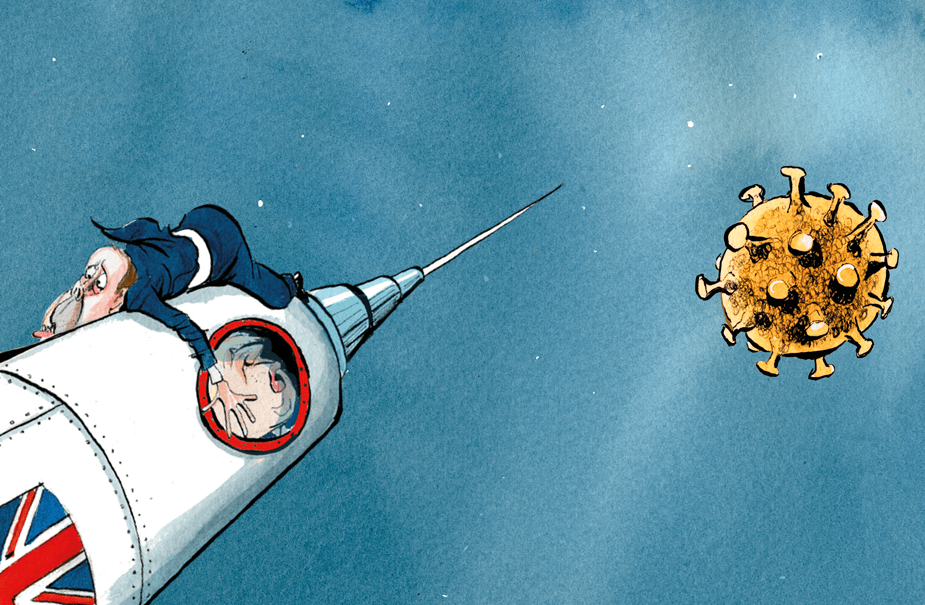I’m worried about Ireland. My family’s homeland is being ravaged by Covid-19. It now has the highest infection rate in the world, according to the expert Covid-watchers at Johns Hopkins University in the US. Ireland’s seven-day rolling average is an eye-watering 1,394 Covid cases per million people. That is way ahead of the UK (810 per million), the US (653 per million) and Germany (248 per million).
It has been a sudden and startling decline. Back at the start of December, following a six-week lockdown, Ireland had the lowest infection rate in the European Union. Now it has the highest in the world.
Many of the newest infections — around 45 per cent — are of the new variant that was first identified in the south east of England. To give a taste of how bad the Irish situation is, get this: around 46,000 people in Ireland have become infected in the past seven days, which is more than the total number of infections in the country between March and October. So, yes, it is bad.
But this health crisis has tragically been compounded by a political crisis. Ireland has been hampered from wielding the most effective of weapons against Covid-19 — the vaccine — because it is bound to the sluggish, failing European Union. The EU has badly dragged its heels on the rollout of vaccines, and countries like Ireland are paying the price.
When you’re in the EU, your ability to swiftly address and respond to the needs of your own people is stymied
Given the Covid surge in Ireland, you might expect that doctors would be out on the streets and country lanes day in, day out, administering the vaccine to the vulnerable and then to everyone else. In reality, the vaccine rollout has been fatally slow. At the start of this year, on 3 January, Ireland had received just 40,000 doses of vaccines, and it had administered 1,500 of those. By 8 January, 15,000 had been vaccinated. In a country of five million, that meant just 0.3 per cent had been vaccinated. More vaccines have been administered over the past few days.
Why the slowness? Much of it is down to how the EU has handled the ordering and distribution of vaccines. Everything has been done centrally. The EU’s 27 member states have been forbidden from organising their own approval or procurement of vaccines, instead having to wait for the go-ahead from Brussels. Commission President Ursula von der Leyen was explicit: on the matter of vaccine procurement, ‘We do this together, and no member state on this legal binding basis is allowed to negotiate in parallel.’
For a country like Ireland, this means being at the mercy of the European Medicines Agency (EMA), which has been far slower than Brexit Britain’s medical authorities in approving vaccinations, and also having to wait for stashes of vaccines from the EU’’s centrally procured stocks. This is generating understandable fury in the republic.
Marc MacSharry, the Fianna Fáil MP for Sligo-Leitrim, has been incandescent about the slow rollout of vaccines. The EU’s bureaucratic lethargy is costing Ireland dear, he says. ‘It seems clear that in a European and national context we have strangled ourselves with process, procedure and bureaucracy’, says MacSharry. He continued: ‘We have [experts] telling us the sky is falling in in terms of new cases and hospitalisations. It’s a real emergency, yet one week on we had used less than 5 per cent of doses provided to us?’
MacSharry noted the perversion of the fact that the Pfizer-BioNTech vaccine, which the EU has approved, is, ‘of German origin and manufactured in Belgium, yet Israel and Bahrain, neither members of the EU, are leading the charge’. Ireland is now in the terrible situation of watching as its neighbouring country Britain — and even Northern Ireland just across the border — starts to roll out the cheap, easy-to-store Oxford-AstraZeneca vaccine, while it cannot do the same because the EMA hasn’t approved that vaccine yet.
This is incredibly serious. Bureaucracy and uber-centralisation are the last things a country needs in a time of crisis. As a headline in the Irish Times put it: ‘Plea for faster vaccine rollout as six die with Covid-19 at Laois nursing home.’
Over the past four years, we were told time and again that Ireland would suffer terrible economic consequences once Britain left the European Union. Brexit would hit this little country hard, experts said. Shamefully, Brussels, and some Remainers too, exploited Irish concerns about Brexit and the potential of a ‘hard border’ to demonise the entire project of Britain leaving the EU and to argue that it just wasn’t worth it.
And yet in early 2021, with Britain finally, formally set free from EU rules and regulations, it isn’t Brexit that is hurting Ireland — it is the European Union. It is Ireland’s membership of this highly centralised, dangerously bureaucratic oligarchy that is hampering the Irish rollout of a life-saving vaccine that could help to push back the Covid surge.
This is not to say ‘I told you so’. This is far too depressing a situation for that. Last year was the first year in their lives that my parents, Irish immigrants to the UK, did not visit Ireland. Covid and lockdowns have tragically interrupted the flow of people between Ireland and the UK and kept families apart.
But it is important to point out the dangers of bureaucracy, and why it is bad for nation states to abandon their ability to be thoughtful and flexible by signing up to a centralised oligarchy in which every member state must play by the same rules. When you’re in the EU, your ability to swiftly address and respond to the needs of your own people is stymied, because the project of ‘European unity’ takes precedence over all else.
We should help Ireland out. It’s our neighbour and our friend. Millions of Irish people live and work in the UK. We are intimately connected. Screw the rules — Brexit Britain, free of EU red tape, should offer to include the Irish Republic’s five million citizens in its vaccination project. Let’s get these two islands fighting fit so that we can face the future together, as friends.








Comments
Comments will appear under your real name unless you enter a display name in your account area. Further information can be found in our terms of use.